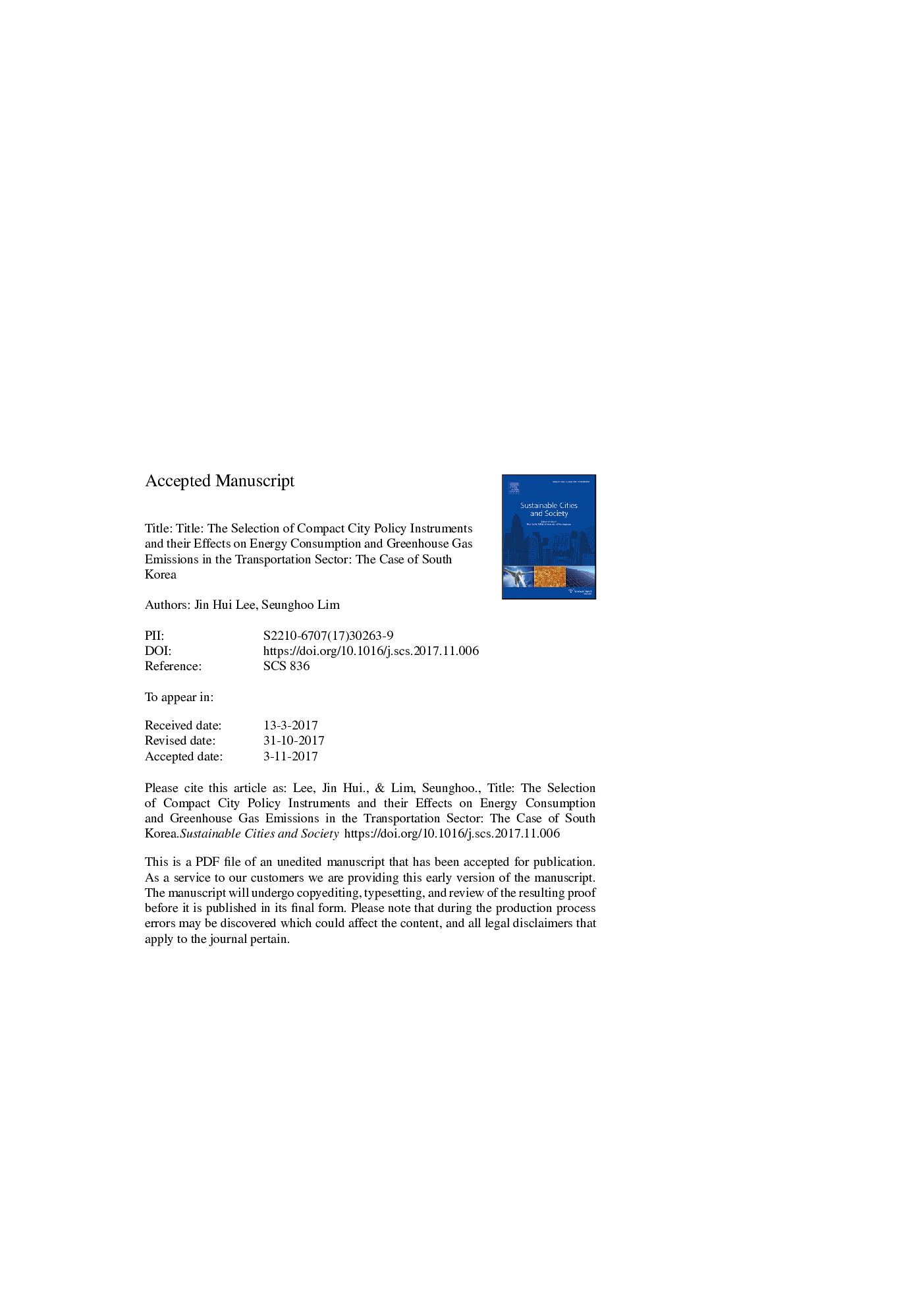| کد مقاله | کد نشریه | سال انتشار | مقاله انگلیسی | نسخه تمام متن |
|---|---|---|---|---|
| 6775753 | 1432011 | 2018 | 38 صفحه PDF | دانلود رایگان |
عنوان انگلیسی مقاله ISI
The selection of compact city policy instruments and their effects on energy consumption and greenhouse gas emissions in the transportation sector: The case of South Korea
ترجمه فارسی عنوان
انتخاب ابزارهای کمکی شهرانه و تأثیر آنها بر مصرف انرژی و انتشار گازهای گلخانه ای در بخش حمل و نقل: مورد کره جنوبی
دانلود مقاله + سفارش ترجمه
دانلود مقاله ISI انگلیسی
رایگان برای ایرانیان
کلمات کلیدی
شهر فشرده، نهادهای سیاسی، انتخاب ابزار سیاست، مصرف انرژی، انتشار گازهای گلخانه ای،
ترجمه چکیده
این مقاله از مورد کره جنوبی به منظور تعیین عوامل موثر بر انتخاب سیاست های محلی دولت برای دستیابی به مفهوم شهر جمع و جور و آزمایش این که آیا این ابزارهای سیاست سبب کاهش مصرف انرژی و محیط زیست شهری می شود، مورد استفاده قرار می گیرد. نتایج رگرسیون لجستیک دوتایی نشان می دهد که ویژگی های اجتماعی-اقتصادی دولت ها و مکان های دولتی آنها در پیاده سازی ابزارهای جمعی شهری مرتبط با شهرسازی نقش دارند. نتایج مدل های خطی سلسله مراتبی نشان می دهد که بین شهرنشینی بیشتر و مصرف انرژی های مرتبط با حمل و نقل و انتشار گازهای گلخانه ای در بخش حمل و نقل رابطه ای مثبت وجود دارد. این نتایج نشان می دهد که برنامه ریزی شهری برای اندازه ی مطلوب شهر، ویژگی های قابل توجه شهر و سیاست های مؤثر با تامین مالی کافی می تواند به کاهش مصرف انرژی و آلودگی هوا کمک کند. بنابراین، ما نیازمند سیاست های ابتکاری شهری برنامه ریزی شهری و فرایندهای اجرای سیاست برای دستیابی به بهره وری انرژی و بهبود کیفیت هوا در زمینه های شهری هستیم.
موضوعات مرتبط
مهندسی و علوم پایه
مهندسی انرژی
انرژی های تجدید پذیر، توسعه پایدار و محیط زیست
چکیده انگلیسی
This paper uses the South Korean case to directly identify the factors that affect local governments' policy instrument choices for achieving the compact city concept and test whether these policy tools lead to low energy consumption and environmentally friendly urban areas. The results of binary logistic regressions show that local governments' socio-economic characteristics and their locations influence the implementation of compact city-related urban policy instruments. The results of hierarchical linear models suggest that there are strong positive associations between greater urbanization and both transport-related energy consumption and transportation-sector greenhouse gas emissions. These results indicate that urban planning for optimal city size, significant compact city characteristics and effective policies with sufficient financing can help reduce transport-related energy consumption and air pollution. Therefore, we need innovative urban planning policies and policy implementation processes to achieve energy efficiency and air quality improvements in the urban context.
ناشر
Database: Elsevier - ScienceDirect (ساینس دایرکت)
Journal: Sustainable Cities and Society - Volume 37, February 2018, Pages 116-124
Journal: Sustainable Cities and Society - Volume 37, February 2018, Pages 116-124
نویسندگان
Jin Hui Lee, Seunghoo Lim,
